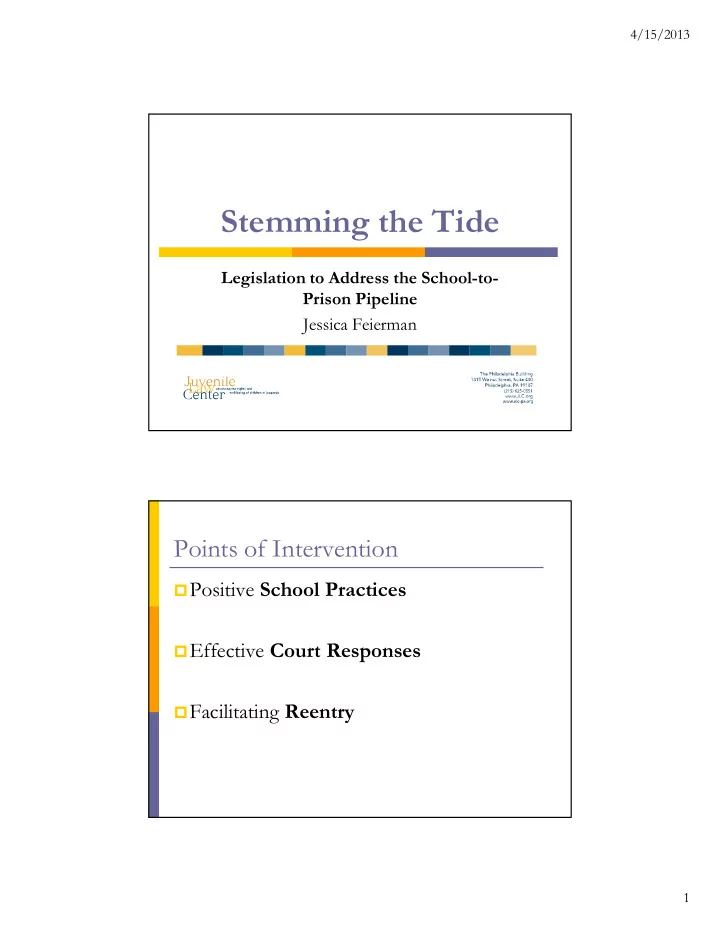

4/15/2013 Stemming the Tide Legislation to Address the School-to- Prison Pipeline Jessica Feierman Points of Intervention Positive School Practices Effective Court Responses Facilitating Reentry 1
4/15/2013 Creating a Positive School Climate Positive Climate Reduces Reliance on Exclusionary Discipline Supporting School-Wide Positive Behavioral Supports Promoting Restorative Justice Funding Trauma-Informed Education 2
4/15/2013 SWPBS Data Reductions in: – discipline referral rates by 50% to 60% – Office discipline referrals – fighting – in-school suspension – classroom disruption Increases in: – academic engaged time – academic achievement – perceived school safety -OSEP Center on PBIS SWPBS - Structure -OSEP Center on PBIS 3
4/15/2013 SWPBS – elements Establishing clear, positive expectations Providing frequent positive feedback Responding to underlying causes of behavior. Teaching ideal and acceptable alternative behaviors DATA-based decision-making. -OSEP Center on PBIS Positive School Discipline Policies • Require evidence-based responses to behavior and discipline. (Indiana) • Establish standards for social and emotional learning (Illinois) • Mandate SWPBS programs in schools with high discipline rates (Maryland) • Require classroom management training. (Louisiana) 4
4/15/2013 Behavioral Health Policies LEGISLATION: Grant program for trauma- sensitive schools Establishment of behavioral health task force (Massachusetts) http://www.massadvocates.org/docu ments/HTCL_9-09.pdf Restorative Justice Policies 5
4/15/2013 Limiting exclusionary practices Limit exclusionary practices Limit suspensions and expulsions to serious offenses (North Carolina) Permit referrals to law enforcement only for fights involving weapons or resulting in serious injury (Tennessee) Require individualized responses Require individual assessment of disciplinary infractions (North Carolina) Require progressive and age-appropriate discipline processes (Georgia) The Role of the Courts 6
4/15/2013 Legislation Governing the Courts Engage courts in brokering multi-stakeholder solutions (New Hampshire) Judicial discretion to suspend delinquency proceedings in exchange for student’s participation in school-based violence prevention (Connecticut) Prioritize community-based treatment (Washington State) Facilitating Re-entry 7
4/15/2013 Meet Educational Needs of Youth in Placement Hold facility education to same standards as all schools (Maine). Require individualized education plans for youth entering placement (Florida, New Hampshire) Require judges to address educational needs of youth at each hearing (Pennsylvania) Smooth transitions between placement and school Transition planning, in consultation with youth and family (Florida) Transition teams (West Virginia, Virginia) Appoint education coordinators in JJ and Ed system (Florida) 8
4/15/2013 Re-enrollment requirements for schools Require home school to: Maintain records (Virginia) Accept full and partial credits (Florida) Convene reintegration team (Maine) Enroll student within designated time period (Virginia) Prohibit home school from: Suspending or expelling student for underlying offenses (Virginia) School Inclusion through Legislation 9
4/15/2013 Contact Jessica Feierman Supervising Attorney Juvenile Law Center 1315 Walnut Street, Suite 400 Philadelphia, PA 19107 Phone: (215) 625-0551 ext 116 jfeierman@jlc.org 10
Recommend
More recommend